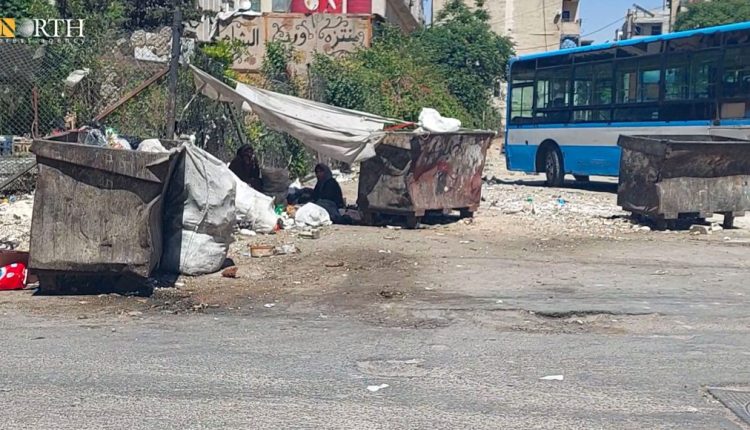
By Safaa Sulayman
DAMASCUS, Syria (North Press) – Waste picking phenomenon emerges in Damascus, the oldest current capital in the world, where people who did not use to work like that, have to wake up early in the morning and start picking waste before garbage trucks arrive and transfer their source of “livelihood” to dumps outside the city.
“I will not eat unless I scavenge through the garbage,” this is the fate of a great number of people who live in Damascus, under the extremely harsh conditions they endure on a daily basis.
Waste pickers start collecting the pieces of plastic, cartoon, stale bread, empty bottles, and anything that can be recycled to be sold to small recycling workshops at very low prices.
Increased phenomenon
In a field survey conducted by Ever Clean, a company contracted with the Syrian government to clean al-Ahdasheriya landfill near Bab Sharki neighborhood in Damascus, it was found that 80 people were working as waste pickers in Damascus back then.
Two years later, the number jumped to 4,000, while currently there are no official statistics available, but daily observations say that the real number is almost hits thousands.
Most waste pickers refuse to speak in front of the camera; they are seen angry, cursing even on air while recording with them, as they are always masked to hide their faces or perhaps to avoid the disgusting smell.
Waste picking is safer
Adnan, 18, who refused to stand in front of the camera, says his father works as a porter, sitting daily in al-Ra’is (President) Square in Jaramana neighborhood in Damascus where porters gather, waiting for someone to hire him to load construction materials or household furniture, and often returns home without money due to the scarcity of work.
He tells North Press that he found more safety in working in dumpster than waiting for a coincidence in the square to work. In dumpsters, he always finds something he can sell and comes back home with 30,000 SYP or may be 40,000 SYP (one USD equals 15,000 SYP).
Adnan points out that this sum is enough for bread and some necessities, which he earns in a period ranging from 10 to 15 hours in waste picking.
A woman who was near a dumpster and refused to reveal her name, says that she is an IDP from a village in the countryside of Deir ez-Zor, eastern Syria. She tells North Press that she lives with her family in an unfinished house in Jaramana neighborhood, and she has five children, as her husband and her eldest son work in waste picking, gaining a sum of about 75,000 SYP per day.
“Garbage is our livelihood”
Muhammad, a waste picker in Damascus, says his family depends on waste picking to live, adding that he stays near the dumpster from the midnight until 6:00 AM so he earns about 50,000 SYP.
He adds that this job is better than begging, and there are no other job opportunities, as he has no solution.
Rabee’, 30, an IDP from the city of Sanamayn in Daraa Governorate, southern Syria, points out that he has been working in waste picking for a year and half, and he earns between 25,000 SYP and 50,000 SYP a day.
Ahmad Saeed, born in 1965, tells North Press that he works in waste picking because he is disabled, and he has undergone surgeries, adding that he earns about 10,000 SYP a day.
Government statements
The Syrian government turns a blind eye to this increased phenomenon, except for a statement by the Director of the government’s Environment in Rif Dimashq Governorate, southwest of Damascus, Muthana Ghanem, to a local website in 2022, saying that waste picking is widespread throughout Syria and not in a specific area.
However, he called this phenomenon as a process of “garbage sorting,” explaining that the workers select materials that can be sold and invest in.
Ghanem added that there are groups headed by individuals. Those individuals hire men, young men and children whose mission is to sort the garbage and hand it over to their heads who, in turn, sell it.
He believed that poverty has no role in this issue because if there were no profits, nobody would work in it, adding that this work is not legal.
Law No. 49 of 2004 of the Syrian government, related to “public cleanliness affairs and preserving the aesthetic appearance of the city”, prohibits “garbage picking in containers and baskets of shops”. Based on the law, a fine ranging from 1,000 SYP to 3,000 SYP (about $0.25) is imposed for waste picking.
Late in May, Martin Griffiths, U.N. Emergency Relief Coordinator, said the situation in Syria is deteriorating year by year, as 16.7 million is the highest number since the start of the conflict 13 years ago.
Griffiths added that “More than seven million people remain displaced within Syria, with millions more living as refugees in neighboring countries.”
